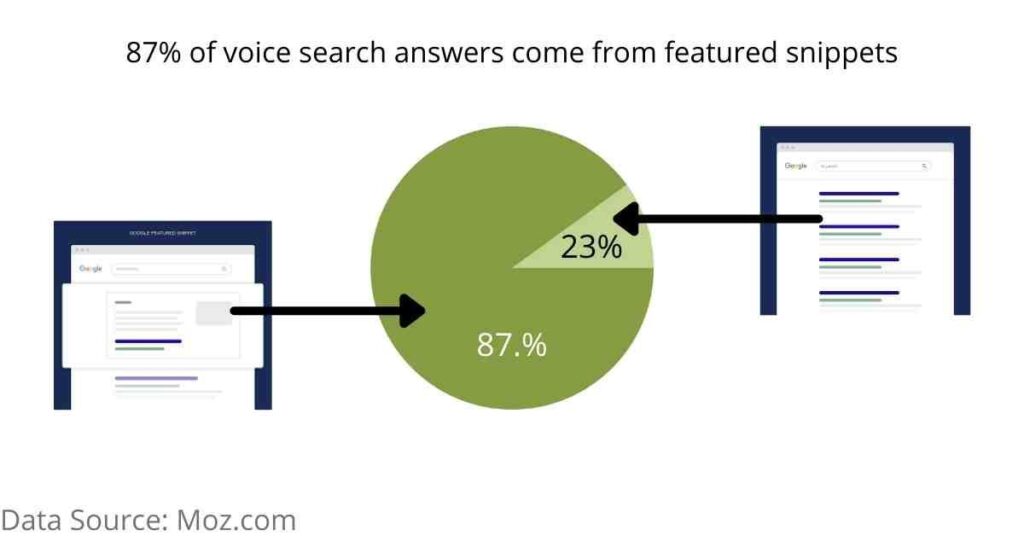Is voice search optimization really necessary for SEO?
As you intensify your SEO techniques to face rising competition for Google ranking and perfect your website design to impress visitors, you might be missing out on something.
An upcoming development that has the potential to change how you do business.
If ignored you’ll miss the train that’s taking progressive SEO strategists to online success and the customers you so badly desire to impress will not find you.
Voice search is a digital trend that’s been showing tremendous growth lately.
According to a study by e-Marketer, 39.4% of internet users in the US use voice search while PwC previously found 71% of internet users prefer voice search over typing.
Hence, the impact of voice search on SEO is likely to be huge.
Therefore, you should study how voice search accounts for your traffic and optimize your content for voice search.
In this article, I’ll show you how optimizing for voice search will impact your SEO strategy.
Let’s dive in.
1. It Emphasizes Featured Snippets
When Google introduced search engines in 2014, it wanted to answer people’s queries fast. A user learns all they need to know on the search results page without having to leave.
This development enhanced user experience, although it might have negatively impacted traffic to websites.
With voice search on the scene, featured snippets are becoming increasingly important for webmasters.
A study by Moz.com found that 87% of voice search answers come from featured snippets. This shows how critical the impact of voice search on SEO is and why you should adjust your strategy accordingly.
Featured snippets are the summary answers from web pages placed at position zero on the search engine results page. It’s a bordered block of text with your search terms bolded and sometimes an image on the side.
Google selects this text from websites if it considers it the best answer to a search query.

Optimizing for voice search will enhance your SEO strategy since your focus will include structuring your content for easy crawling by Google bots.
First, you need to include identifiable extracts by utilizing H-tags, meta descriptions, and bullet points to organize your content.
Secondly, your blog content writing strategy should involve factual and concise writing. Answer questions directly and precisely in one paragraph or one sentence if possible.
Last but not least, write content that answers many closely related questions in an organized format using headings and subheadings.
This structured format helps Google comprehend your content and improves your chances of acquiring position zero.
2. It Highlights Semantic Search
Every internet search has an intention behind it. Whether it’s seeking information, getting guidance towards a specific goal, or initiating a transaction, all these intentions matter a lot to SEO strategists.
Semantic search is a technique in which a search engine aims to find the keywords and determine the meaning and intention behind the search using contextual analysis.
Google knows what you want and sometimes what you want to do with the data.
For instance, when you search “best shoes for men,” your search results page will be populated with products because Google identifies a transactional intention.
As more people ask virtual assistants like Siri and Alexa questions, search engines adapt to natural language and advance their search intent identification capabilities.
According to Google, 27% of internet users around the world use voice search on mobile.
This illustrates the importance of voice search optimization if you’re keen on ensuring you maintain top SERP positions.

As such, your SEO strategy requires a little tweaking as follows.
Optimize for topics rather than keywords. Keyword optimization is slowly phasing out.
Google has advanced well enough to know that “web design companies” and “web development companies” mean the same thing. If you optimize your content for the topic, you’ll still rank for both keywords.
By the way, find out why you need a web design agency for your business.
In addition, use semantic markup and schema to convey the meaning of each element. Individual entity attributes help Google provide users with more targeted results and thus increases your chances of earning rich snippets.
3. It Focuses Attention on Question Words
Internet users are fond of asking questions. Thus, it’s not surprising that most voice searches will include question words such as who, how, and where.
Unlike standard searches where a user can use a combination of words to get a result, voice searches incline a user to make sense out of the words spoken.
An analysis by SEOClarity of Google voice search answers found that almost 20% of featured snippets answers are triggered by a set of 25 words, 10 of which are question words.
The words “how” and “what” were the two most frequently occurring terms.
With such statistics, you cannot ignore the impact of voice search on SEO. Optimizing your content for question words is necessary if you wish to improve your Google rankings.
By delivering accurate and relevant answers to these questions, you improve your chances to earn rich snippets and attract additional traffic to your site.

However, it’s necessary to distinguish between simple questions and those that require comprehensive coverage.
Why?
Questions that require short responses would not drive traffic to your site even if you earned the snippets.
For instance, the question “who is the president of Kenya” will trigger a simple snippet with the answer, Uhuru Kenyatta, which is enough. Writing a 1000 word SEO-optimized blog post on ‘who is the president of Kenya’ is almost certainly a waste of time.
On the other hand, a question like “how to sell online” would require a comprehensive guideline on the process of selling products online.
Indeed, you’ll get more traffic from this query than the former.
4. It Encourages Natural Language
Constant innovation to improve user experience characterizes the digital era. Every day, new technological advancements are introduced with the potential to change how we operate for the better.
Voice technology has seen its fair share of improvement. The current, reliable voice recognition systems and voice intelligence have enabled search engines to understand natural human language.
Today, you can pose a series of questions on virtual assistants, and they’ll answer you appropriately in most cases.
When internet users conduct voice searches, they usually engage in natural conversational language.
According to Google, almost 70% of requests to Google Assistant are expressed in natural language, unlike the typical search queries used in web search.
Based on these statistics, I cannot emphasize enough the importance of voice search optimization through the use of natural language in content writing.

It is essential to create conversational content as it appeals to most readers and can be easily understood.
The temptation to use industry jargon to pronounce your credibility and authoritativeness might not settle well with readers, especially in niches that the average user frequents.
Spoken language isn’t as concise as written language. It’s typically longer and more specific, which further demonstrates the impact of voice search on SEO.
As a webmaster, analyze your audience and account for how they interact with content and social media to understand better how to write optimized content that makes sense to them.
In addition, you should account for your audience’s voice search phrases and adjust your SEO strategy to focus on long-tail keywords and conversational language.
5. It Inspires Local Search Optimization
Google introduced localized search results to help internet users access information on local enterprises.
Through Google My Business listings, companies can take advantage of map snippets in the google search results page to showcase their products and services to local customers.
Meanwhile, customers enjoy a great experience when seeking local services.
Emphasis on local search is part of how optimizing for voice search will impact your SEO strategy. It’s necessary to upgrade your local SEO strategies to take advantage of voice search.
A study conducted by BrightLocal found that 58% of consumers use voice search to find information about local businesses, and 46% of voice search users look for a local business daily.
Do you now see the importance of voice search optimization?

Suppose you want local customers to find your business. In that case, you should claim your business listing as soon as possible and optimize the information you provide to cater to your local customers.
Then, upgrade your SEO strategy to include periodic updates to your business listing to offer the latest relevant information.
In addition, an often overlooked aspect of business listings is the use of images. We are visual beings.
We process visual content way faster than text. Including several high-quality good-looking images on your Google My Business listing can go a long way to give your business a positive image.
Lastly, actively encourage customers to drop reviews on your listing. BrightLocal’s 2020 Survey found that 87% of consumers read local business reviews.
Having many great reviews on your products and services can significantly improve your company’s customer acquisition.
Conclusion
Have you been optimizing your website for voice search?
If not, start now.
Now, you know how optimizing for voice search will impact your SEO strategy. These guidelines should help you enhance your techniques to leverage this newfound opportunity.
Here at Glivers, we offer SEO consulting services to help you build your online presence.
Click here to schedule a free consultation, after which we’ll assign you a personalized SEO team to research and assess your business and digital campaigns before recommendations are made.
After that, we’ll swiftly get into action in a uniform direction. Since we both understand the importance of voice search optimization, let’s work to extract the most value from your SEO efforts.



